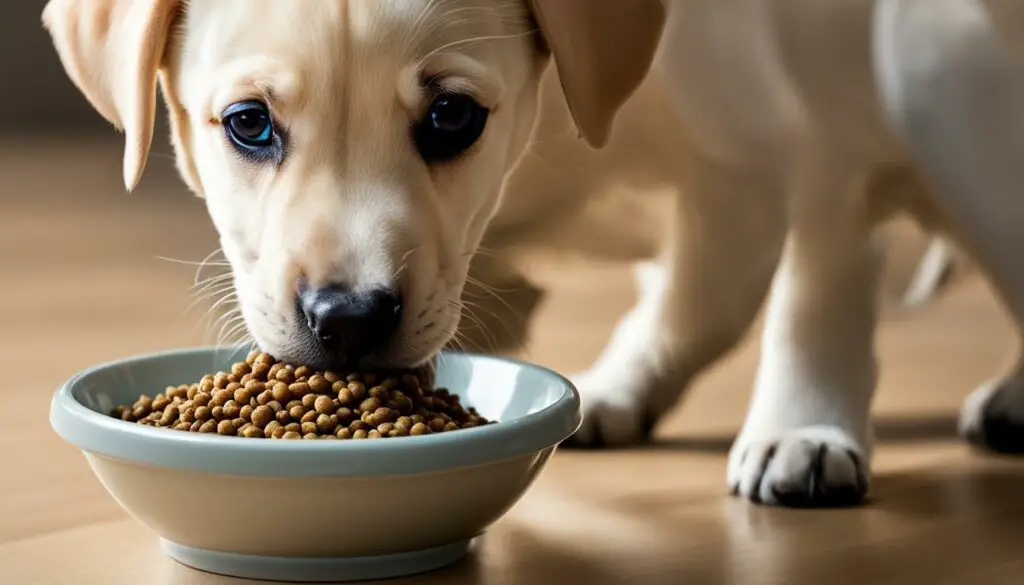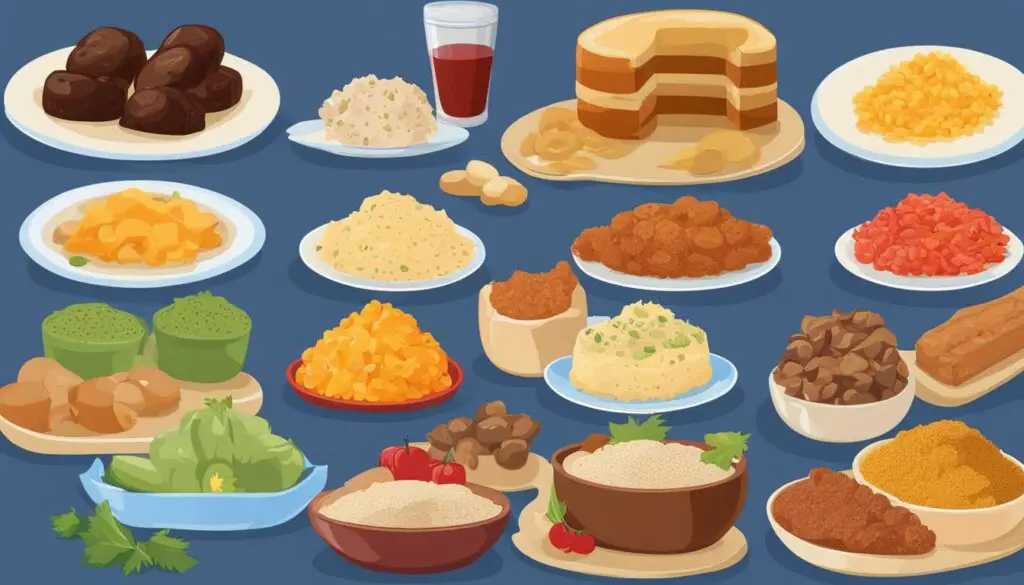Feeding a Labrador puppy requires attention to their nutritional needs to support their growing body and development. This complete nutrition insight will provide feeding tips, a feeding schedule, and the best food options for your labrador puppy.
We will also discuss how much to feed a labrador puppy and provide a feeding guide to ensure your puppy’s nutrition is well-balanced and optimal for their growth.
Following these guidelines can give your labrador puppy the nutrition for optimal health and development.
The Importance of Proper Nutrition for Labrador Puppies
Feeding a Labrador puppy requires careful attention to their nutritional needs to support their growing body and development.
Providing your puppy with the proper nutrition is essential for building strong bones and teeth, adding muscle, and supplying energy for play and learning.
A well-balanced diet is crucial during this critical growth stage to ensure overall health and well-being as they mature into adult dogs.
Labrador puppies have unique dietary requirements due to their rapid growth and development. It is essential to provide them with a diet that meets their needs.
You can ensure their optimal health and development for a happy and active life by giving them the proper nutrition.
Choosing the Best Food for Labrador Puppy
Feeding your Labrador puppy with the best food is crucial for their growth and development. Choose top-notch puppy food made for Labrador retrievers for the best nutrition.
Look for brands that meet AAFCO nutrient guidelines for complete and balanced nutrition. These formulas are designed to support your puppy’s specific needs, providing them with the essential nutrients they require during this critical stage of their life.
Labrador puppies have unique nutritional requirements due to their rapid growth and energy levels. They need a balanced diet with a proper ratio of protein, fats, and carbohydrates to support their muscle development and overall health.
Additionally, the best food for Labrador puppies should contain adequate levels of vitamins, minerals, and antioxidants to support their immune system and promote healthy skin and coat.
Feeding Schedule for Labrador Puppies
Maintaining a regular feeding routine is essential to ensure the health and well-being of your Labrador puppies. A regular feeding routine helps regulate their digestion and ensures they receive the proper nutrients at the correct times.
Here is a comprehensive feeding chart for Labrador puppies to guide you:
This feeding chart outlines the recommended amount of food based on your Labrador puppy’s age and weight. It helps you determine the appropriate portions to provide balanced nutrition and maintain their optimal body condition.
Labrador puppies should ideally be fed three times a day during the early stages, from weaning through four to six months. After six months, you can transition to two feedings per day.
How Much to Feed a Labrador Puppy

Feeding a Labrador puppy is crucial to promoting their growth and development. Ensuring they receive the right amount of food is essential for providing the necessary nutrition that enables them to thrive with abundant energy and essential nutrients.
However, determining the appropriate feeding quantity for a Labrador puppy can be challenging. Consider their age, weight, and activity level to establish the ideal portion size. As a general guideline, puppies typically need around twice as many calories per pound as adult dogs of the same breed.
The recommended feeding amounts provided on commercial puppy food labels can be a helpful starting point. These guidelines are typically based on the puppy’s weight and age.
Remember that these are just guidelines; you may need to adjust the portions based on your puppy’s growth and body condition.
Ensuring your Labrador puppy receives the right amount of food is crucial, but it’s equally vital to prevent overfeeding.
Overfeeding can result in obesity, increasing the risk of joint problems and other health issues in the future. Being mindful of your puppy’s diet is the key to promoting a healthy weight and overall well-being.
Considerations for Large-Breed Labrador Puppies
Feeding Labrador retriever puppies requires special attention, especially for large-breed puppies. Breeds like Great Danes and Doberman Pinschers are more susceptible to skeletal and joint problems, including hip dysplasia.
To mitigate these issues, providing them with the right amount of food and avoiding excess calcium and phosphorus is essential.
It will also address the importance of a well-balanced labrador puppy diet for their growth and development.
Special Dietary Considerations for Labrador Puppies
Providing a balanced and appropriate diet is essential to ensure their overall well-being. Labrador puppies should avoid certain foods that can be harmful to their health. Knowing what to feed lab puppies is essential to prevent any digestive upset or potential health complications.
The labrador puppy food chart and labrador diet chart can serve as helpful guide when determining the best food options for your puppy. These charts outline the recommended types of food and the appropriate portion sizes based on your labrador puppy’s age and weight.
When choosing the best dog food for a labrador retriever puppy, selecting a high-quality brand that meets their nutritional needs is crucial.
Homemade Food for Labrador Puppies
Regarding providing the best nutrition for your labrador puppy, some dog owners prefer to prepare homemade food.
This can be a valid and personalized choice to ensure your puppy’s dietary needs are met. However, consulting with a veterinarian or canine nutritionist is crucial to formulating a homemade diet plan that fulfills all the requirements.
Preparing homemade food gives you control over the ingredients and quality of the food your labrador puppy consumes. By including lean protein sources, carbohydrates, vegetables, and healthy fats, you can create a well-balanced diet.
Additionally, incorporating necessary supplements ensures your puppy receives all the nutrients required for growth.
Remember, homemade food should be formulated based on your labrador puppy’s needs and nutritional requirements. Seeking professional guidance will help you create a customized meal plan that promotes optimal health and development.
Transitioning to Adult Dog Food

When your Labrador puppies are approaching their anticipated adult weight, typically between 12 to 18 months, it’s important to transition them from puppy food to adult dog food.
To make this change, gradually blend small portions of the new adult food with their current puppy food.
Over a week or two, slowly increase the ratio of adult food in their meals. This gradual transition helps their digestive system adjust smoothly to the new diet.
Adult dog food provides the appropriate balance of nutrients for their maintenance needs. Ensure the adult dog food you choose suits their size and activity level.
When transitioning your labrador puppy to adult dog food, it is essential to consider their nutritional requirements as they grow and mature. The best food for labrador puppies during this stage should provide the necessary nutrients to support their ongoing growth and development.
The Role of Proper Nutrition in Feeding Senior Labrador Retrievers
Labrador Retrievers are known for their loyal and friendly nature, and as they enter their senior years, their nutritional needs may change.
As Labradors age, they may become more prone to weight gain and certain health conditions such as arthritis or hip dysplasia. It is crucial to adjust their food intake based on their activity level and any specific health concerns they may have.
A labrador feeding chart can help you determine the appropriate amount of food for your senior Labrador.
In addition to maintaining a healthy weight, senior Labrador Retrievers may benefit from a specialized diet designed to meet their aging needs.
These diets often contain essential nutrients and supplements that support joint health, promote healthy digestion, and provide optimal nutrition for overall well-being.
The Role of Treats and Bonding in Labrador Puppy Nutrition
Treats are a delightful method to reinforce positive behavior and enhance the connection with your puppy. However, it’s crucial to be mindful that treats shouldn’t constitute a substantial part of your puppy’s daily calorie intake. Balancing treat-giving with a nutritious diet is essential for your puppy’s overall health and well-being.
Remember, most of your Labrador puppy’s nutritional needs should be met through their regular puppy food, formulated to provide all the essential nutrients they require for healthy growth and development. Conversely, treats often lack the necessary balance of nutrients and can be high in calories.
Selecting treats that match the size and age of your Labrador puppy is crucial for their well-being. It’s important to refrain from offering table scraps, as these can disturb their digestion and encourage undesirable begging habits.
Opting for treats specifically designed for their breed and age ensures a healthier and more enjoyable treat experience for your furry friend.
Instead, focus on bonding with your puppy through playtime, positive reinforcement, and training sessions. These interactions strengthen your relationship and provide mental stimulation and a sense of fulfillment for your Labrador puppy.
FAQ
What is the best food for a Labrador puppy?
The best food for a Labrador puppy is formulated to meet AAFCO nutrient guidelines for complete and balanced nutrition. Consult with your veterinarian to determine the most suitable diet for your puppy.
How often should I feed my Labrador puppy?
Labrador puppies should be fed thrice daily from weaning through four to six months if possible. After six months, twice-a-day feedings are suitable.
How much should I feed my Labrador puppy?
The food to feed a Labrador puppy depends on their age and weight. Use a feeding chart designed explicitly for Labrador puppies to determine the appropriate amount of food.
Do Labrador puppies have any special dietary requirements?
Labrador puppies have specific nutritional needs because they overgrow. It’s crucial to give them a balanced diet that caters to their requirements during this critical growth phase.
What should I avoid feeding my Labrador puppy?
To ensure the well-being of your Labrador puppy, it’s important to be mindful of their diet.
Avoid giving them avocados, chocolate, grapes, raisins, macadamia nuts, raw bread dough made with yeast, onions, garlic, chives, milk, large amounts of dairy products, alcohol, coffee, caffeine, salty foods, and anything sweetened with xylitol.
These items can be harmful to your puppy’s health, and steering clear of them will help keep your furry friend happy and healthy.
Can I feed my Labrador puppy homemade food?
Opting for homemade food is suitable for Labrador puppies, but it’s crucial to ensure that their nutritional requirements are adequately met.
To achieve this, you should seek guidance from a veterinarian or a canine nutritionist who can help you create a well-balanced homemade diet plan tailored to your puppy’s needs.
When should I transition my Labrador puppy to adult dog food?
When your Labrador puppies grow and reach about 12 to 18 months, you can switch them to adult dog food. Do it gradually by mixing some new food with their puppy food.
Increase the amount of adult food slowly over one or two weeks until that’s all they eat. This helps them get used to the new food without issues and ensures they get the proper nutrients as they grow.
Do senior Labrador Retrievers have different dietary needs?
As Labrador Retrievers age, their dietary needs may change. Senior Labradors may benefit from a weight management formula or diet suitable for their aging needs.
How should I use treats in my Labrador puppy’s diet?
Treats should be used in moderation and not make up a significant portion of your Labrador puppy’s diet. Limit treats to no more than 5% of their daily caloric intake, and choose appropriately sized treats for your puppy’s breed. Focus on bonding and positive reinforcement through playtime, training sessions, and time spent together.

